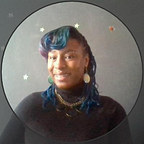Decolonising in Libraries, Archives and Special Collections
Extracts from my segment of the “Unlocking Narratives: The Roots of Decolonising/Decolonizing Work in UK Libraries and Archives” talk focusing on Decolonising/Decolonizing in Libraries, Archives and Special Collections Through POC lead curation
Working in archive and special collections has been a wonderful experience thus far and personally I feel has influence not just my academic but creative endeavours in a multitude of ways.
Libraries, special collections and archives are brimming with the potential to be inclusively inspirational environments, this however will take time, collaboration, impassioned work and adaptability so the ideals and concepts cultivated can be maintained for the future. It is important and is building the foundations for a new type of education. We all have a responsibility as instigators of change, but truly effective change takes time and support.
Archives are a wonderful space to consider decolonisation from different aspects, the shared history, bringing to light marginalised groups and critically reflecting upon the lens through which we see and analyse things taking note of and celebrating the interconnectedness of society and cultures.
To see yourself reflected is more than inspiration it is a foundation to build upon, a community to shape, a movement to be a part of an opportunity to change the future. Decolonising brings to light that which always had value but was overlooked because of the indoctrinated mind-set of colonialism
A small nod to say you can do this too you have value, and to use the share diaspora as a strength to unite and share.
“ I felt like the archive wasn’t about me, it was about the different people. It wasn’t about weather I liked work or not. It was that the work was there, it needed to be archived, it needed to be available. “ — Rita Keegan
I feel that this quote is amazingly poignant in describing how important it is to ensure that we not only preserve the different voices especially of those marginalised groups but also that in archives and special collections it is not about personal likes and dislikes it is about ensuring that it is preserved and made available but are also we don’t lose any elements that are important to the cultures, societies, communities or artists in order to try and authentically preserve their voices in a way that may not have been done for specifically because of the exclusion of marginalised groups.
It is both inspiring and empowering to see not just action being taken but also collaborative work going on between researchers, lecturers, educational establishments, communities, students, and graduates. It is important and is building the foundations for a new type of education and information sharing society.
We all have a responsibility as instigators of change, but truly effective change takes time and support.
Video linked bellow to find out more and hear the other fantastic talks as part of the UCL Department of Information Studies and Open Aspirations event on Wednesday June 8th at 5.30pm 2022 entitled “Unlocking Narratives: The Roots of Decolonising Work in UK Libraries and Archives”.
________________
Sources:
Goldsmiths University of London Special Collections and Archives
Goldsmiths Textiles Collection and Constance Howard Gallery
Rita Keegan, Journey to Here | Genealogies of Black Curating in Britain Rita Keegan, Journey to Here | Genealogies of Black Curating in Britain - YouTube
